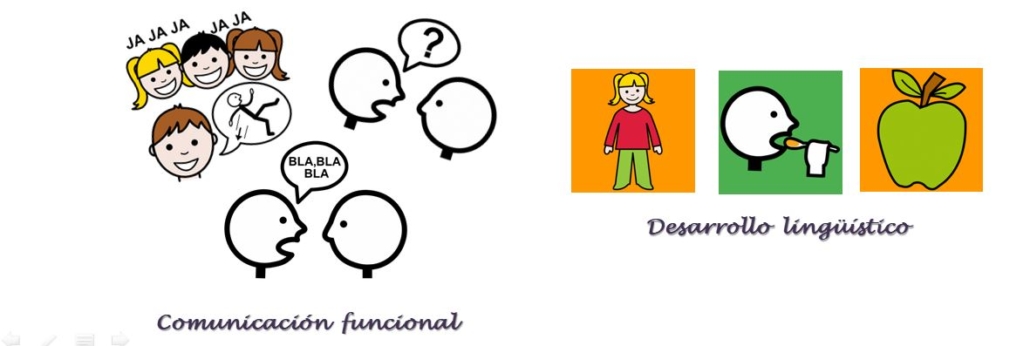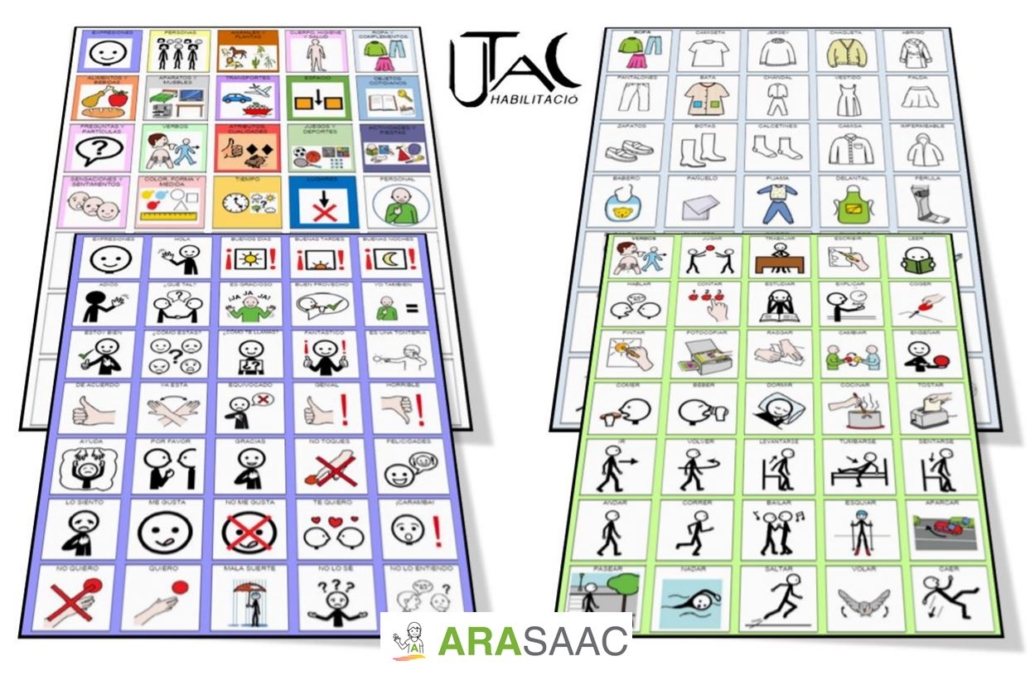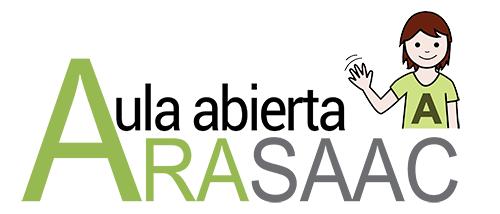This work is licensed under a Creative Commons Attribution-NonCoercial-ShareAlike 4.0 International license.
Our thanks to Fàtima Vega, Claudia Serramià, Marc Coronas, Carme Rosell and Emili Soro
Universitat de Barcelona – Departament d’Educació i Departament de Treball, Afers Socials i Famílies de la Generalitat de Catalunya
for the wording of this article and for its willingness to collaborate with ARASAAC
Introduction to CACE-UTAC vocabulary
CACE stands for Augmentative Communication and Environment Control. With this name, in 2007 a research project led by the University of Barcelona and the Universitat Politècnica de Barcelona was carried out with a grant from IMSERSO.
The Unitat de Tècniques Augmentatives de Comunicació UTAC,a service of the University of Barcelona in collaboration with the Generalitat de Catalunya,developed the “Proposal for theorganization of pictographic vocabulary for computers and communication boards”,which was concretized in a pictographic communicator called Comunicador CACE-UTAC.
From the initial proposal we will make updates of the vocabulary, as well as versions adapted to the needs of users and new technological resources. The CACE-UTAC Communicator is a central vocabulary that grows with the progress in user communication.
Project objectives
The objectives of the CACE-UTAC project are specified in
- Provide a vocabulary base, freely accessible,for users of pictographic systems.
- Provide a vocabulary that enhances the development of language in addition to promoting daily communication.
- Offer a broad lexicon that facilitates the necessary customization. Professionals and family members select the appropriate vocabulary according to the person and the context.
- Organize a support product for communication structured in categories according to semantic and syntactic parameters.
- Facilitate that the support products for the communication of high and low technology of the same user have identical content.
Poster and vocabulary list CACE-UTAC
For more information on the initial development of vocabulary you can consult the poster that was presented at the International Congress of the ISAAC 2010,in Barcelona:
See CACE-UTAC pictograms on the ARASAAC website
–
Selection of CACE-UTAC vocabulary
Respecto a la selección y la adaptación del vocabulario se proponen los siguientes criterios:
- Evolutionary approach:age-appropriate vocabulary.
- Ecological approach:vocabulary needed according to the context.
- Personalization based on the interests and reality of the user. Some of the categories that require greater customization, adding vocabulary from the beginning, are: people (relatives, colleagues, professionals …), places (places where you usually go and are not included in the default vocabulary), games and sports (toys or games that are of interest to the user). Vocabulary customization can be a key element to the success of any augmentative communication system.

- Functional communication:expression of demands, but also other communicative functions such as asking, explaining, refuting, joking, nuancing, etc.
- Linguistic development:lexical diversity, extension of statements, etc.

- Selection of more symbolic pictograms: choose pictograms with “stick” people (schematic) rather than more concrete and detailed pictograms.

- Selection of colorless pictograms: unless the color is something characteristic of the object (e.g. a lemon), it may be interesting to choose colorless pictograms.

Versions of the CACE-UTAC in different media
To facilitate the work of families and professionals, different versions of the CACE-UTAC vocabularyhave been built, both for printing on paper and for use in electronic communicators.
Versions that do not require commercial augmentative communication software are built with ARASAAC symbols.

The VOCABULARY CACE-UTAC 20 categories is developed for Microsoft Word (with grids of 7×10 and 5×7),
- CACE_15_categorías_agrupadas_Castellano_4x5: Spanish version of the CACE vocabulary with 15 categories (grouping the 20 of the original version). Vertical pages in a 4×5 grid, with ARASAAC pictograms.
- CACE 15 categories agrupades Català 4×5: Versió en català del CACE amb 15 categories (agrupant les 20 de la versió original). Vertical pàgines in a graella of 4×5 amb pictograms ARASAAC.
- CACE 15 categories grouped Castilian 5×7: Spanish version of the CACE vocabulary in Word format. Vertical pages in a 5×7 grid with ARASAAC pictograms.
- CACE 15 categories agrupades Català 5×7: Versió en català del CACE amb 15 categories (agrupant les 20 de la versió original). Vertical pàgines in a graella of 5×7 amb pictograms ARASAAC.
- CACE categories agrupades Català 7×10: Versió en català del CACE per Word. Vertical pàgines in a graella of 7×10 amb pictograms ARASAAC.
Subsequently, an adaptation of the CACE-UTAC vocabulary was made by merging some of the categories proposed in the initial version. This adaptation generated a new vocabulary proposal organized into 15 categories.
You also have available different versions for Grid 3,for LetMeTalk,for Snap Core First (with grids of 6×4, 5×4 and 4×4), Plaphoons and Boardmaker.
All these versions can be found by clicking on the following image of the Unitat de Tècniques Augmentatives de Comunicació (UTAC).












